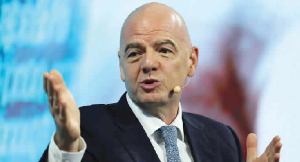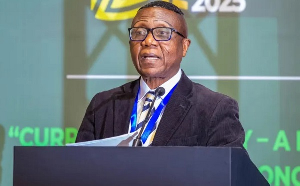Editorial – Critical Challenges Currently Chastising Ghanaians
By Kwesi Atta Sakyi 19th
August 2013
It is sometimes very much worrying for people to engage in cheap and silly talk, or in pontifications and prescriptions, to what government ought to do, or should have done but did not do, or could do in the foreseeable future to fix our myriad problems in Ghana. As if those in government did not have ears to hear, or eyes to see. In pidgin parlance, one would badger that, ‘ibe so so talk talk, wey Omo Ghana and wey Obodo Ghana fit kampe do? Na dem sabe book long. Na weting dem call am, knowledge?’
It may also be equally worrisome if those who should know better, and who are in government, do hear what the people want, but then they do nothing, and pretend to see nothing wrong in playing the deaf, the blind, the ostrich, all in one. Our leaders sometimes become indifferent to the pleas of the suffering masses. Why then, in the first place, did we elect them and elevate them to those high public offices? Were they sincere when they sought and courted our mandate to lead?
Were they convinced themselves that they were of leadership pedigree? Did they know what was in store for them, and did they prepare themselves adequately enough by acquiring those critical thinking skills needed to lead? Did they identify the right workable team which would enable them deliver on their promised deliverables, as contained in their manifestos and in the speeches at the political rallies preceding the elections? We elect leaders to plan and provide a vision for us to achieve the better life for the majority of the people, what is usually termed the greatest good for the largest number of people, implicitly enshrined in the social contract to govern in the public interest.
But what do we see? Roles are reversed. We now have the situation of the greatest national booty going to the miniscule few, who happen to be leading. Is this a re-enactment of the Orwellian satire of Animal Farm? Sometimes, I am inclined to side with the Jehovah’s Witnesses who, as much as practically possible, would not take part in any partisan or national civic duties because of their conviction that they serve no government of this earthly realm. Haba! But are they not living in this earthly realm, and don’t they benefit from social, public and economic capital provided through politicking and partisan politics?
This is my point of departure with the JWs. I think that they are wrong in standing aloof of political goings-on in their own country, because that attitude is tantamount to abdication of their bounden civic responsibilities to the state, because the state and the church are coterminous, conjoined, intertwined and inseparable. I would not here want to raise a heresy or the great controversy, about the schism and dichotomy between the state and the church, because in 1517, Martin Luther had started the Reformation and its concomitant inquisition, when he nailed his 95 theses at the gate of Wittensberg University at Erfurt in Germany.
He was declared an apostate, and the Pope at the time exclaimed, ‘A wild boar has entered into the vineyard of the Lord.’ I am not a Catholic, else, I risk being declared an apostate, heretic and a candidate for excommunication, for broaching this testy topic.
Be that as it may, the ancient Israelites clamoured for a King like their neighbours did, and they had their first King, King Saul. He was to be followed by others such as David, Solomon, Rehoboam, Jereboam, Uzziah, Ahab, among others. Before then, they were led by prophets and priestly personages such as Moses, Aaron, Joshua, Zadok, Samuel, among others.
Right now in Ghana, we face the ignominious prospect of some false prophets or charlatans, who raise unnecessary hullabaloo, thereby creating fear and panic among the populace. Some of these are known to have tap roots connected to some political parties who use them as unholy vessels and megaphones for generating unacceptable decibels of media cacophony, and for pulling the legs of their political adversaries. As it were, religion has become the opium of Ghanaians (apologies to Chairman Mao). It is cardinal to serve the Lord, but not in the materialistic and deceitful manner some of our people are misled to believe in, in Ghana. Perhaps, we need a law to regulate and provide modalities to rein in the rot and riot in our religious sector.
On our clergy, it can be said that some of them have poor training, as some have acquired dubious degrees and qualifications from cheap mushrooming universities abroad. Some have even used online printing facilities to carve degrees for themselves. These are the ones seeking attention by making the most media noises.
They seek self-aggrandizement and self-enrichment. They cow their followers into believing that they are endowed with powers of being seers, healers and counsellers. They have become self-centred instead of looking after the spiritual welfare of their pasturage or pastorate. The low quality of education in Ghana now has paradoxically and ironically extended even into the very church which brought quality education into Ghana. What with the garbage we now have in the quality of some of our clergy?
The Bible enjoins us not to judge others so as to be judged ourselves. So, I will rest here my case. The wolves living among the sheep in the clergy will be known by their fruits and the sounds they make. As a believer, I can say that the day of reckoning is coming in the second coming of our Lord Jesus Christ, when all our works, whether good or bad, will be subjected to the scales for judgment. It is said that planning not to plan is also a plan, or what we call muddling through, or planlessness or freewheeling opportunism approach. Some people say that planning not to plan is planning to fail.
Currently in Ghana, we do not seem to have any viable long term planning on the part of our central government, This is evident in the way and manner our political party system encourages every new government to discard the projects of the outgoing government, and to start new ones of their own, so that they can cut corners and engage in some selfish money-making ventures.
This is a serious flaw in our system. This is not the case in the First World democracies of say UK, Canada, Germany, USA, among others. Perhaps, we need a major review of our existing 1992 Constitution so as to come up with a foolproof system, whereby incoming governments will be bound by law to finish off national projects initiated by their predecessors. Currently, Ghana is caught in a web of a stop-go-gap development cycle.
Every now and then, our Ministry of Finance and Economic Planning makes the budget and it is presented to the nation with fanfare and a great deal of numerical detail is thrown at us, as if those magical numbers which are conjured up and thrown at us were the annual budget rituals which would deliver the goods the politicians promised us. May we pose the question, ‘What percentage of those budget plans have been realized or actualized over the last 13 years, since J J Rawlings left office?
Every year, reels and reels of interminable budget figures of astronomical proportions are churned up and thrown at us, in a ritual of budget fanfare, pomp and pageantry. Is it one of Shakespeare’s ‘Much ado about nothing? Many beautiful plans and programmes have been announced or launched, costing billions of taxpayers’ and donors’ money, but rarely do we see much concrete evidence in the implementation of those beautiful and ambitious plans. The few programmes which get implemented may even end up having very poor quality because of corruption in the tendering process.
This is because competent contractors with expertise and capacity may be sidelined, and pro-political party cadres who know next to nothing, may be preferred and awarded contracts. Take for example the ongoing Accra-Kumasi road which has taken forever to complete. We lack proper project implementation, inspection and supervision. The budget making process has just become a mere annual ritual of just going through the motions of presenting a budget. If our resources to execute plans are limited, then let us not announce plans which will not see the light of day. Or else, we raise false hopes and create high expectations.
The quality of the generality of our leadership in Ghana today in all departments, be it social, political, economic, administrative, leaves much to be desired. We lack leaders who are imbued with high sense of integrity, patriotism, assiduity and altruism. We lack proactive, perceptive, people-centred and problem-solving leaders in Ghana today. Rather, we have reactive and do-little political leaders who settle for Herbert Simon’s satisficing or bounded rationality attitude of management.
Many of our leaders today have become introverted, narcissistic and greedy leaders. Many of our MPs today are in parliament just to add up the numbers or to get the perks, per diems, loans, mid-term gratuities and the trappings of office, such as being addressed as Honourable. I think this once dignified term, Honourable, has become a misnomer and a big joke and cliché, and one of the most despicable terms being bandied around in Ghana this time around. Of course, there are genuine honourable Honourables among the bad lot.
The dishonourable Honourables are the ones who engage in infra dig activities such as trading insults brazenly on radio, lying through their teeth at every turn in broad daylight on the airwaves, engaging in many sordid acts of humungous bribery and corruption, which end up in gargantuan national judgment debts, among other uncategorized nefarious acts. Our leaders today fail to devote ample time to debating issues of national development in the august legislature.
They should be debating in parliament issues such as how to improve the quality of our declining educational system, how to increase the stock of quality roads, how to revamp our rundown railway infrastructure, how to generate alternate sources of energy, using clean and safe sources, such as solar, tidal wind, biomass, biogas, geothermal, biofuel and perhaps, as a last resort, nuclear.
Our leaders should seriously be brainstorming and problem-solving to come up with viable solutions to our endemic pandemic of rampant armed robberies, cyber crime, shortages of gas and fuel, among others. It is a shame that Ghana, a country endowed with rich fertile soils, abundant sunshine, and numerous types of food items should be wasting millions of dollars to import food. Agriculture holds the key to our having sustainable development. If the agricultural sector is given the attention it deserves, then we can create thousands of jobs and it will create multiplier effect on our GDP.
We must and should make agriculture the leading sector in Ghana. This is what Paa Kwesi Nduoum and PPP say they will do if they capture the commanding heights of power in Ghana. This is what Busubrum Kofi Annan has been busy telling our African leaders, to put a premium on domestic food security, by investing much more in agriculture. Currently, we have serious problems in our institutions such as GYEEDA, SADA, TOR, ECG, GHAPOHA, GJA, GFA, NMC, IRS, GPS, MCCEs, among others. What are we planning to do to stop the rot in these state institutions?
Why cannot we employ expatriates as CEOs to man some of these failed institutions? Critics will argue that, that will be unpatriotic and a negation of the policy of indigenisation and Ghananisation, of Ghanaians gaining the commanding heights of our own economy. Critics like Paa Kwesi Mintah might argue that Ghanaians in the Diaspora are more qualified than those expatriates.
But are those Ghanaian Diasporeans willing to go home to take up jobs and contracts when approached or invited? The answer is capital NO! Therefore, where our own leaders have failed, we can outsource their jobs to foreigners who will give us value for money. This practice is competitive, open and highly beneficial because in a globalised world, we should endeavour to get the best through meritocracy and not mediocrity.
Currently our ill- advised and politically motivated Single Spine Salary Scale Structure (SSSSS) is in shambles and the Graham–led administration is under pressure to deliver the promise of the then Kufuor largesse. The scheme has become a minefield and a timebomb, triggering many industrial actions across the country, because of perceived inequities and unpardonable anomalies. The scheme has woefully failed and has become a hornet’s nest. A huge backlog of wage bill hangs over the paymaster–general's head like the sword of Damocles, or like an albatross around his neck.
The National Health Insurance Scheme (NHIS) which was modeled after the one in the UK is not functioning properly, as health care delivery in Ghana is on the rocks, with many poverty-stricken families resorting to traditional herbal medicine, and other sources of alternative medicine. People are dying needlessly from common diseases such as malaria, dysentery, typhoid fever, among others.
Doctors, nurses, dispensaries and private clinics have a field day capitalizing on the dire straits to fleece the masses. In many cases, ambulances are in severe short supply in most rural and urban areas. Health issues aside, inflation has reached double digits of about 10%. The exchange rate of the Cedi has taken nosedive, amidst the removal of fuel and other subsidies. On our transport infrastructure, we have a lot of potholes on our urban roads. How are we to maximize foreign exchange earnings from our exports and imports, if our railway stock and infrastructure is worn out and half operational?
Currently, the lockjam of traffic on our urban roads increases the cost of doing business in the cities such as Accra and Kumasi. Some city roads are very narrow and heavily congested with vehicular and human traffic. Is it time to decentralize some central government functions to the regional capitals, or is it time to build a new capital for Ghana? As more time is spent in traffic, it means business hours and opportunities are lost or wasted, more fuel burnt, more carbon monoxide discharged into the atmosphere to deplete the ozone layer, increase in stress levels to commuters, creating an unhealthy nation, and a whole gamut of domino effect.
These are negative externalities and social costs. Instead of our media news outlets holding useful discussion fora, they wallow in media cacophony by politicking. Radio and TV output content is heavily tilted in favour of political content, which could be as high as 80%. We should change our attitudes for the better, by pursuing long term holistic goals, and ensure that we have holistic and sustainable development.
This means making some serious sacrifices now in the short term, for long term gains via streamlining and drastically cutting down on our over-bloated government and governance apparatuses. We need to reduce the size of the cabinet, scrap the glorified and non-functional District and Municipal Assemblies, and vigorously pursue the policy of decentralization, whereby local governments are empowered to generate their own incomes, and not enfeebled and emasculated of funds so that they continue to be at the aprong strings of the central government. This would have been the editorial I would have written today if I were the editor of the Daily Graphic or the Ghanaian Times.
Contact: kwesiattasakyi449@gmail.com
The Author is a Senior Lecturer at ZCAS, Lusaka, Zambia.
Opinions of Friday, 23 August 2013
Columnist: Sakyi, Kwesi Atta
Critical Challenges Currently Chastising Ghanaians
Entertainment













